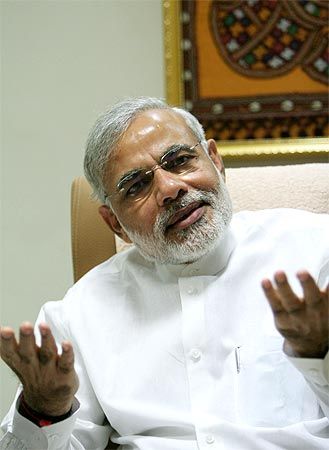Longtime diplomatic observers feel that if Narendra Modi were to become prime minister or even a Cabinet official if the BJP captures power in the next election, there is no way the State Department would refuse him entry into the US, unless Washington wanted to risk the unravelling of the carefully nurtured US-India strategic partnership. Rediff.com's Aziz Haniffa reports from Washington, DC.
 Nisha Desai Biswal, the new United States Assistant Secretary of State for South and Central Asian affairs, who was sworn in last week as the point-person for the region, deftly parried questions on the Narendra Modi US visa controversy in her debut interaction with the media at the Foreign Press Centre in Washington, DC, on Tuesday, December 3.
Nisha Desai Biswal, the new United States Assistant Secretary of State for South and Central Asian affairs, who was sworn in last week as the point-person for the region, deftly parried questions on the Narendra Modi US visa controversy in her debut interaction with the media at the Foreign Press Centre in Washington, DC, on Tuesday, December 3.
Obviously cognisant that if there was one sure question that would be asked it would be if there was any change in the US visa policy toward the Bharatiya Janata Party's prime ministerial candidate, Biswal came armed with policy guidance on this issue.
"I would just note that there has been no change in US rules or regulations with respect to its visa policy. And that is that all individuals apply and have to undergo a review process. And so the point at which there is an application, there will be a review process, and I can't speak to what the outcome of that process would be," Biswal told the media.
"So as far as I am concerned there is no news there. There is no change in policy there. It is as it has always been, which is that visa applications are reviewed on a case-by-case basis," she asserted.
But the reporters continued to query the Gujarat-born Biswal, the first Indian American to be appointed to this senior State Department position, as to what would be the outcome if Modi were to be elected prime minister, since she herself in her opening remarks had said that the US looks forward to working with India whatever the outcome of the next election.
At this point, Biswal found herself explaining the differences between the regular visa and diplomatic visa categories, which indicated to longtime diplomatic observers that if Modi were to become prime minister or even a Cabinet official if the BJP captures power in the next election, there is no way the State Department would refuse him entry into the US, unless Washington wanted to risk the unravelling of the carefully nurtured US-India strategic partnership.
Biswal, trying to be as diplomatic as she could, said, 'I don't want to get too far into the weeds of consular affairs because I am probably not the one that can go chapter and verse, but my understanding is that we have diplomatic visas, A-1 visas, for government officials who are on official business who are members of the national government, and for all other individuals the normal process is a tourist visa and that goes through the individual application process."
"And so depending on the official and the capacity in which they are visiting, the determination is made on what kind of visa they are applying for. So beyond that, I would probably have to refer you to the consular affairs folks to get more into the weeds," she said.
In March 2005, Modi was denied a US visa for his alleged complicity in Gujarat's sectarian violence in 2002 -- which left nearly 2,000 people, mainly Muslims, dead -- when he had applied for a visa to attend the Asian American Hotel Owners Association annual convention where he was to deliver the keynote address.
Interestingly, the refusal of the visa at the time to Modi came just two days after then US Secretary of State Condoleezza Rice's visit to India and although the Congress party-led United Progressive Alliance government had no love lost for Modi, it summoned the then US deputy chief of mission at the American embassy in Delhi, who at the time was Robert O Blake, Biswal's most immediate predecessor in the current position, and lodged a strong protest over Washington's decision, calling it 'uncalled for.'
The external affairs ministry had said at the time, 'The action on the part of the US embassy is uncalled for and displays lack of courtesy and sensitivity towards a Constitutionally elected chief minister of a state of India.'
The US embassy had said that Modi's tourist and business visa, issued in 1998, had been revoked and there was no chance he would be issued a diplomatic visa either.
<p.Earlier, the US embassy said Modi's tourist and business visa, issued in 1998, had been revoked and he would not get a diplomatic visa either.
At the time, an angry Modi had called the US decision 'an insult to the Indian Constitution and an attack on Indian sovereignty.'
But the US held firm and did not issue him a visa, saying the decision had been taken under the provisions of the Immigration and Nationality Act, 'under which any foreign government official responsible for serious violation of religious freedom is ineligible for a visa.'
The State Department had said that 'the US law is clear that states or government officials responsible for carrying out serious violations of religious freedom are ineligible for a visa.'
Image: The BJP's prime ministerial candidate Narendra Modi Photograph: Rajesh Karkera/Rediff.com











 © 2025
© 2025